
As February 2025 rolled around, I started seeing “remember when” kind of posts on Instagram. Normal, right? Everyone loves a #throwbackthursday. What shocked me, however, was the theme of the throwbacks – remember when we all learned to make sourdough? Remember when we thought we should wash all our groceries or set up home offices? The time we spent learning and unlearning feels both like just yesterday and like something from an alternate universe. Four whole years later, it can almost feel like “Did that actually happen?”
\n \nI’ll tell you who didn’t forget that period – teachers and school staff. Not only were their lives particularly disrupted by the on-again, off-again of remote learning (remember when we did gym class in our living room?) but more than maybe anyone else, these are the folks that continue to see the long-term impact that this period of social isolation has had on the little learners coming through their classrooms. Whether with focus and attention, emotional regulation, or social skills, many students have struggled to pick up the pieces that got missed during that tumultuous time.
\nAnd it’s not just the impact from the pandemic. Overall, students seem to be experiencing higher levels of stress and pressure at all ages and grade levels. It’s a complicated time to be a kid!
\nThankfully, we have moved so far in our world towards a better and more holistic understanding of mental health. In our schools, what this means is that:
\nA. Teachers have a better understanding of what their students are experiencing and how it is impacting their learning.
\nB. Resources have been allocated such that mental health support exists in some form in almost every school these days.
\nThat’s great news! The difficulty, then, is in understanding what resources are available for your child at their unique school and with their unique needs, and how to support your child in accessing these resources. Here are a few helpful hints when it comes to navigating the mental wellness supports in schools:
\nSeek clarity. At every school, in every school board, there are bound to be differences in titles, roles and responsibilities. Guidance counsellor, school psychologist, child development advisor, family wellness worker… it can be hard to decipher who to talk to and for what. Your child’s teacher can give you a comprehensive understanding of the supports available in their school as well as the differences between each. For example, guidance counsellors typically support students with career transition planning including post-secondary, so that might not be the right person for help with bullying or social skills.
\nGet involved. Mental wellness supports in schools are still a relatively new addition, so it makes sense that there will be a lot of questions that come up when your child is working with one of these supports. Reach out, send an email, or set up an appointment during parent/teacher interviews. These staff want to hear from you and learn from you too.
\nIt takes a village. Remember too that no singular support or resource is going to be the be-all and end-all. Schools and school boards are full of specialists, and the best work happens when everyone comes together with a common goal of support. That includes you! At the end of the day, you are the expert on your child’s needs, strengths, and unique challenges. Don’t be afraid to advocate for what they need.
\nEveryone can benefit from mental wellness support. Even if you don’t feel that your child needs particular mental health support, like one-on-one therapy sessions, there is so much value for all students in learning about coping skills, resiliency, and stress management. Support your child in finding out how they can learn and grow from these valuable resources. If nothing else, you are teaching your child to see mental health support as important and accessible, and not something to be scared of. What an important lesson that they will carry for the rest of their lives!
\nEvery student deserves to feel safe and cared for at school. For many, the support of a mental health worker or professional can be the missing link to feeling successful and reaching the great potential that you have seen in them all along.
\n\n
Aimee is a registered social worker who has been working in mental health, addictions, homelessness, and education in Calgary for the last 15 years. She is passionate about working with young people (anywhere from Kindergarten to teen years and up) and takes her role as the fun auntie very seriously. A born and raised Calgarian, Aimee attended the University of Calgary for both her bachelor's degree and her Master of Social Work.
\n\n
See our related articles:
\nCalgary’s Child Magazine © 2025 Calgary’s Child